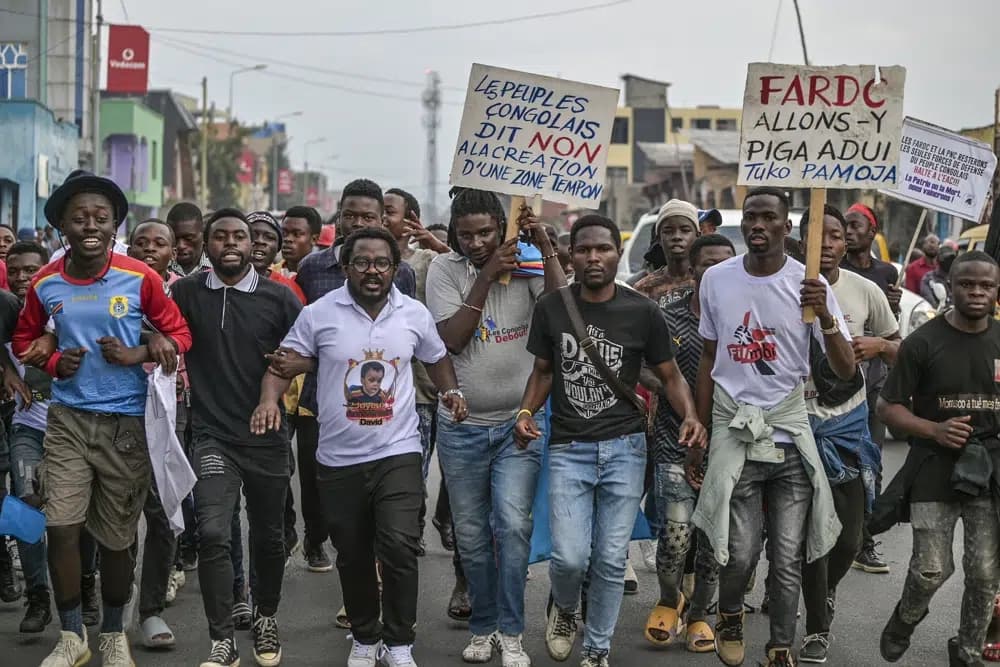YAOUNDÈ, Cameroon – Catholic Bishops in the Democratic Republic of Congo have roundly condemned the government’s use of force against peaceful protesters demanding better living conditions.
On May 20, tens of thousands of people took to the streets to protest the high cost of living in a nation that is both wealthy in mineral resources and underdeveloped in terms of economic conditions.
The cost of basic goods including beer, tomatoes, rice, sugar, oil, and flour has been rising daily in Congo, in part as a result of Russia’s war in Ukraine.
Official figures indicate that a loaf of bread that used to cost CFA 1,000 ($0.5) now costs CFA 1,200 ($0.6). A 20-litre can of oil has gone from $30 to $45, and a 25 kg bag of rice from $18 to $25.
For a nation where three-quarters of the populace lives below the poverty line, the rising prices are difficult to bear. On Saturday, Congolese poured into the streets in protest.
“Life has become unbearable, look at how the volume of bread has dropped. We are demanding change in Congo, social change,” said Bindanda Bilisi in an interview with Africanews.
However, the issue goes beyond the high cost of living. The opposition has also made use of the demonstrations to underscore how unhappy they are with how the electoral process is shaping up in advance of general elections slated for December.
“It is a peaceful march to protest against a chaotic electoral process that is preparing President [Félix] Tshisekedi to hold onto power by force, against the high cost of living, against oppression,” said former Prime Minister Augustin Matata, who co-organized the protests with other opposition political parties and civil society representatives.
The protests were met with violence, as police used tear gas to disperse the crowds.
In a statement released May 22, Catholic bishops in one of the continent’s most Catholic nations denounced “the ignoble and violent savage repression on the marchers, especially the minors found on their route, by the forces of law and order and its partner militias. In carrying out their macabre work, they did not hesitate to fire live ammunition, even aiming at the vehicle of a political leader.”
The bishops’ conference “condemns in the strongest terms all these monstrosities described above as well as the violence that followed, wherever it came from. It expects the competent authorities to take concrete action, beyond the media promises of investigations and justice (to which we are accustomed and which often remain unfulfilled), in order to put this whole series of easily identifiable thugs out of action,” the statement said.
The Congolese Minister of Human Rights, Albert-Fabrice Puela, joined the bishops in condemning “acts of repression” and “brutality” against the demonstrators including “minors”.
“We demand that the justice system carry out urgent investigations so that responsibilities can be established for the various violations,” Puela said.
The bishops challenged the forces of law and order to relocate to the borders where there are real security concerns instead of staying to “harass the population in the cities.” The clerics urged the Congolese people “not to give in to fear in the face of barbarity organized to intimidate them.”
“If nothing is done to guarantee their fundamental rights, they will soon have to exercise their power to sanction all the incompetents,” the prelates said.
A presidential election is scheduled to take place on December 20. Tshisekedi, who has been in power since January 2019, is seeking re-election.
Electoral processes in the DRC long have been fraught with opacity. On May 10, the Catholic Bishops and the Eglise du Christe du Congo already raised red flags on the way the Independent Electoral Commission is going about a revision of electoral lists.
While the church bodies supported the commission’s choice to work with an outside partner to audit the voter rolls, the faith leaders weren’t happy with the foundational procedures set down by the elections monitoring organization.
The electoral commission has proposed engaging an external firm to audit the electoral registers, but the methodology to be used will be developed and approved by the commission itself.
“It follows from the foregoing that the team that shall be put in place will not be independent, and its report could be twisted or manipulated,” the church groups said. “Consequently, there is a high risk that there will be no consensus around the electoral registers, suspicion amongst political actors will be reinforced and public confidence in the electoral process will wane even further. And that will eventually lead to disputed electoral results.”
Therefore, the church organisations urged the electoral commission to hire an independent, reputable auditing firm and a few reputable local specialists to audit the election registers and thereby restore public faith in the Congo’s electoral system.














